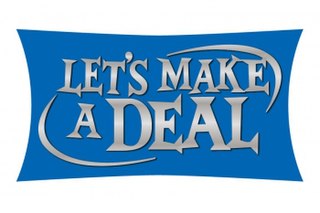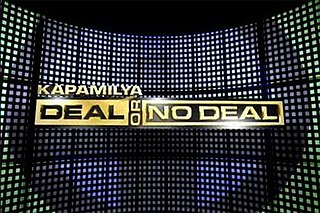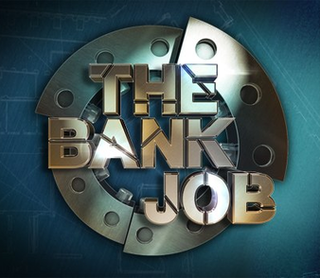
Let's Make a Deal is a television game show that originated in the United States in 1963 and has since been produced in many countries throughout the world. The program was created and produced by Stefan Hatos and Monty Hall, the latter serving as its host for nearly 30 years.
Deal or No Deal is the name of several closely related television game shows, the first of which was the Dutch Miljoenenjacht. The centerpiece of this format is the final round which is played with up to 26 cases, each containing randomly assigned sums of money. After the player for the case game is determined, this contender claims one case or a box at the start of the game, without its contents being revealed. The contestant then chooses the other cases or boxes, one at a time, to be immediately opened and removed from play. Throughout the game, the player is offered an amount of money or prizes to quit, being asked the titular question, "Deal or no deal?" If the contestant rejects every deal and eliminates all the other cases or boxes, the player keeps the money that was in the original case or box. Thus, the contestant "wins" depending on whether the player should have taken one of the deals or should have held onto the original case or box until the very end.
Deal or No Deal was an Australian game show that aired on the Seven Network from 13 July 2003 to 4 October 2013. It was the first international version of the game show, after the original Miljoenenjacht from the Netherlands. It was the first of the versions to use the Deal or No Deal name. It was hosted by Andrew O'Keefe for its entire 10-year run.
Deal or No Deal is a British game show, hosted by Noel Edmonds, which originally aired from 31 October 2005 to 23 December 2016 on Channel 4, and is due to return with Stephen Mulhern on 25 September 2023 on ITV. Based on the original Netherlands format of the game show, each episode sees a contestant choosing one of 22 boxes, each containing a cash amount between 1p to £250,000, and then attempting to win as much as possible either by gambling on having a high amount in their chosen box, or making the game's hidden operator, named "the Banker", offer a considerable cash sum for their box regardless of what is inside. The amount a contestant wins is determined by pure luck – cash amounts are randomly allocated to each of the boxes before each game, with contestants required to open a specific number of boxes per round of the game to eliminate the cash amounts their chosen box does not contain, in turn affecting how much is offered by the Banker. Games always end with the player opening all of the boxes, including their own, regardless of how they intend to make money.

Deal or No Deal is an American version of the international game show of Dutch origin of the same name. The show is hosted by Howie Mandel, and premiered on December 19, 2005, on NBC. The hour-long show typically aired at least twice a week during its run, and included special extended or theme episodes. The show started its fourth season on August 25, 2008, a day after NBC's coverage of the 2008 Beijing Olympics ended. A daily syndicated half-hour version of the show debuted on September 8, 2008, and continued for two seasons.

Miljoenenjacht, officially Postcode Loterij Miljoenenjacht, is a Dutch game show, sponsored by the country's postcode lottery, where a contestant and at-home viewer could win up to €5,000,000 or as little as €0.01. The show is broadcast at various times, spanning across six episodes for each set. The program was originally shown by TROS on NPO 2, but moved to creator John de Mol's channel Tien in 2005. After the channel was discontinued after its sale to the RTL Group, the program moved to RTL 4. In 2019, the program moved to SBS6 due to the transfer of Linda de Mol from RTL to SBS.

Kapamilya, Deal or No Deal is the Philippine franchise of Deal or No Deal, presently hosted by Luis Manzano and previously by Kris Aquino, which premiered on June 5, 2006, on ABS-CBN.

Grasz czy nie grasz is the Polish version of Deal or No Deal. It was shown at 7:00pm CET on Saturdays on Polsat. Zygmunt Chajzer was the original host. In its third year, the studio and graphics were updated, as they were to other international versions of the show.
Deal is the Greek version of Deal or No Deal. It airs on Alpha TV and it started broadcasting in January 2006. It is hosted by Christos Ferentinos, who also hosts the Greek version of Fort Boyard on Star Channel. There are 22 boxes held by 22 potential contestants coming from various Greek prefectures. Each episode ultimately features one contestant.

¡Allá tú! is the Spanish version of Deal or No Deal. It was initially broadcast by Telecinco between 2004 and 2008 and later changed to sister channel Cuatro for a comeback in 2011, before returning to Telecinco in 2023.
The Deal is the Japanese franchise of the game show Deal or No Deal. It is hosted by Shinsuke Shimada and aired on the TBS network. So far, the show has been aired only twice: on September 8, 2006 as both a "birthday program" and a Friday-night Special and on April 5, 2007. While the show is called as such, Shimada uses the familiar catchphrase "Deal or No Deal".
Miljoenenjacht is the Belgian version of Deal or No Deal. It aired on VTM, debuting on October 16, 2004. It was hosted by Walter Grootaers, with a top prize was €1,000,000. A second season premiered on October 15, 2005. The show later moved to VijfTV, which produced the Flanders version of Deal or No Deal under the title Te Nemen of Te Laten.
Vas o No Vas is the American Spanish-language version of Deal or No Deal, which debuted on Telemundo from October 8, 2006, to May 26, 2007, and it was produced by Endemol and NBC. The program was hosted by Héctor Sandarti, who hosted the Mexican version of the same name for Televisa. The show was taped at Televisa's Santa Fe studios in Mexico City, Mexico, where Endemol Mexico is based, in the same studio where the Mexican edition was taped. Originally airing Saturday nights at 7 PM ET/PT in a 90-minute format, the show moved to Saturday afternoons at 1PM ET / PT, edited to 60 minutes in length.
Le Banquier was a Canadian game show and the Quebec adaptation of the international game show Deal or No Deal. It debuted on January 24, 2007 at 9 pm on the TVA network. The program, produced in Montreal, Quebec by JPL Production II Inc. and Endemol USA for TVA, is hosted by Julie Snyder. The show's main sponsors are Vidéotron, Hyundai, Maxi, Nissan, Capital One and Sunwing.
Deal or No Deal is a game show which was aired in Singapore on MediaCorp Channel 5 and MediaCorp HD5 for two seasons. Based upon the original Netherlands format of the game show, each episode sees a contestant choosing one of 26 briefcases, each containing a cash amount between $1 and $250,000, and then attempting to win as much as possible either by gambling on having a high amount in their chosen briefcase, or making the game's hidden operator, named "the Banker", offer a considerable cash sum for their case regardless of what is inside. The amount a contestant wins is determined by pure luck – cash amounts are randomly allocated to each of the briefcases before each game, with contestants required to open a specific number of briefcases per round of the game to eliminate the cash amounts their chosen briefcase does not contain, in turn affecting how much is offered by the Banker.
Ber nebo neber is the Czech Republic's version of Deal or No Deal airing on TV Prima from February 11, 2007 to December 27, 2008. The show, hosted by Pavel Zuna, is filmed on a set similar to the United States set and uses the music from that version, but uses the case opening cue when a low amount is opened from the Canadian version. Players can win as little as 1 Kč to as much as 5,000,000 Kč.
Deal or No Deal Malaysia is the English version Deal or No Deal hosted on ntv7. The English-language version of the show premiered on November 3, 2007, hosted by Aanont "Non" Wathanasin. The gameplay is much the same as the Chinese version.
Ai Chang Cai Hui Ying is a charity game show produced by Zhejiang Television. It was premiered on November 15, 2008 and ended on October 31, 2010. The hosts were Chen Huan (陈欢), Tian Yue (天悅), Zuo Yan (左岩) and Huang Ziwen (黄子文) as of the last episode. Former hosts include Hua Shao (华少), Zhu Dan (朱丹) and Shen Tao (沈涛). The format of an internationally famous game show Deal or No Deal was adapted for the first 16 episodes of the show.

The Bank Job is a British television game show broadcast live on Channel 4, hosted by George Lamb. It was first broadcast on 2 January 2012 and ended on 17 March 2012.
Chase the Case is a British television game show created by Lynsey Wylie and produced by Bandicoot Productions for BBC One, that premiered on 17 September 2018. Hosted by Dan Walker, the show features five contestants who compete to win money hidden in briefcases by answering questions and eliminating one another from the game. The show also features Deborah Anderson as a security guard who handles the cases.







